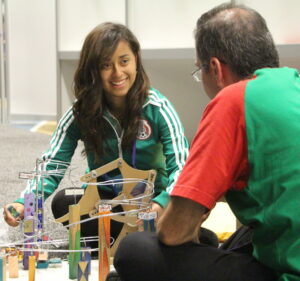Who can be my mentor?
The short answer is: anyone!
A mentor is someone who supports your work and offers constructive feedback. This could be a:

- Teacher
- Parent
- Neighbour
- Any supportive person in your life
A mentor can also be someone who is an expert in the area of your project, so they can support your idea with their
years of experience and knowledge. This could be a:
- Graduate student or professor
- Professional (e.g. engineer, tradesperson)
- Researcher
What can a mentor do?
- Offer support as you work on your project
- Provide constructive feedback about what is working…and what isn’t!
- Help you get access to resources, tools, lab equipment
- Review your work and ask questions, and encourage you to challenge yourself
- Assist you in achieving your goals
Just remember: a mentor can make suggestions, but they can’t come up with your project idea, or do the work for you.
How can I find a mentor?
It doesn’t matter if you’re new to STEM, what your project is about, or where you live – you can find a mentor! A mentor doesn’t have to be someone you already know, or even someone who lives in your community – you can work with anyone in the province, country, or world who is willing to support your project.
In your logbook, write down the answers to these questions to help you get started:
- Who are people in my life that support me when I do something I’m passionate about?
- What is the general theme of my project?
- Do I, or my family, know anyone who knows a lot about this theme?
- Is there a local university or college that has professors, researchers, or grad students that are experts in my project theme?
- Is there a local business with employees who work in a field related to my topic?
- If I research this topic, is there an expert that comes up frequently?
- No matter where they are based, who would be the dream mentor for my project?
Once you’ve answered these questions, you should be able to come up with a shortlist of possible mentors. Figure out which one would be your top pick and contact them. If you don’t hear back after a week or two, reach out to the next person on your list.
Feel free to download this email template to reach out to possible mentors: Mentor Email Template
Responsibilities of both mentors and mentees:
- NOT allow the mentor do the project work for the mentee. The mentee is responsible for their STEM project, and it must be their own work. A mentor’s role is to provide advice and guidance, not to do the project.
- Uphold the highest standard of scientific and ethical standards: Safety & Ethics
- Always treat each other with respect
- Communicate in a professional and truthful manner
- Commit enough time and effort towards the mentorship and what you both aim to achieve. Set clear expectations for each other.
- Do not accept/offer any kind of payment for your mentoring relationship
- Read and respect YSC’s Policy 1.5.5. Academic Integrity
- For the protection of the mentor and mentee, all meetings should be held in the presence of others during business hours, at their school in the presence of a teacher or staff member, or at another location with a parent/guardian present.
